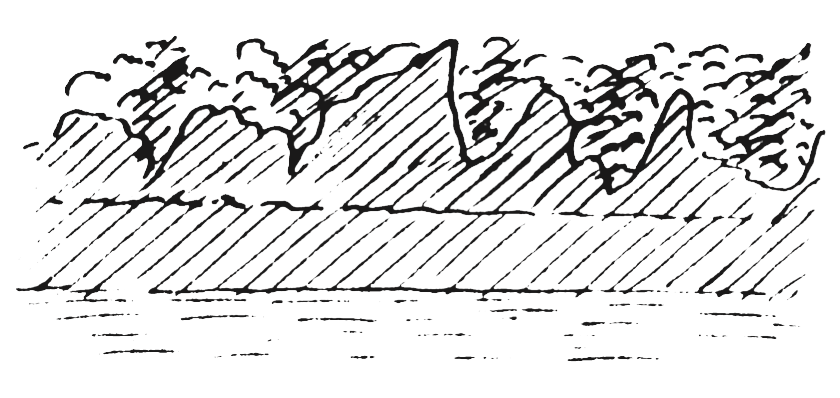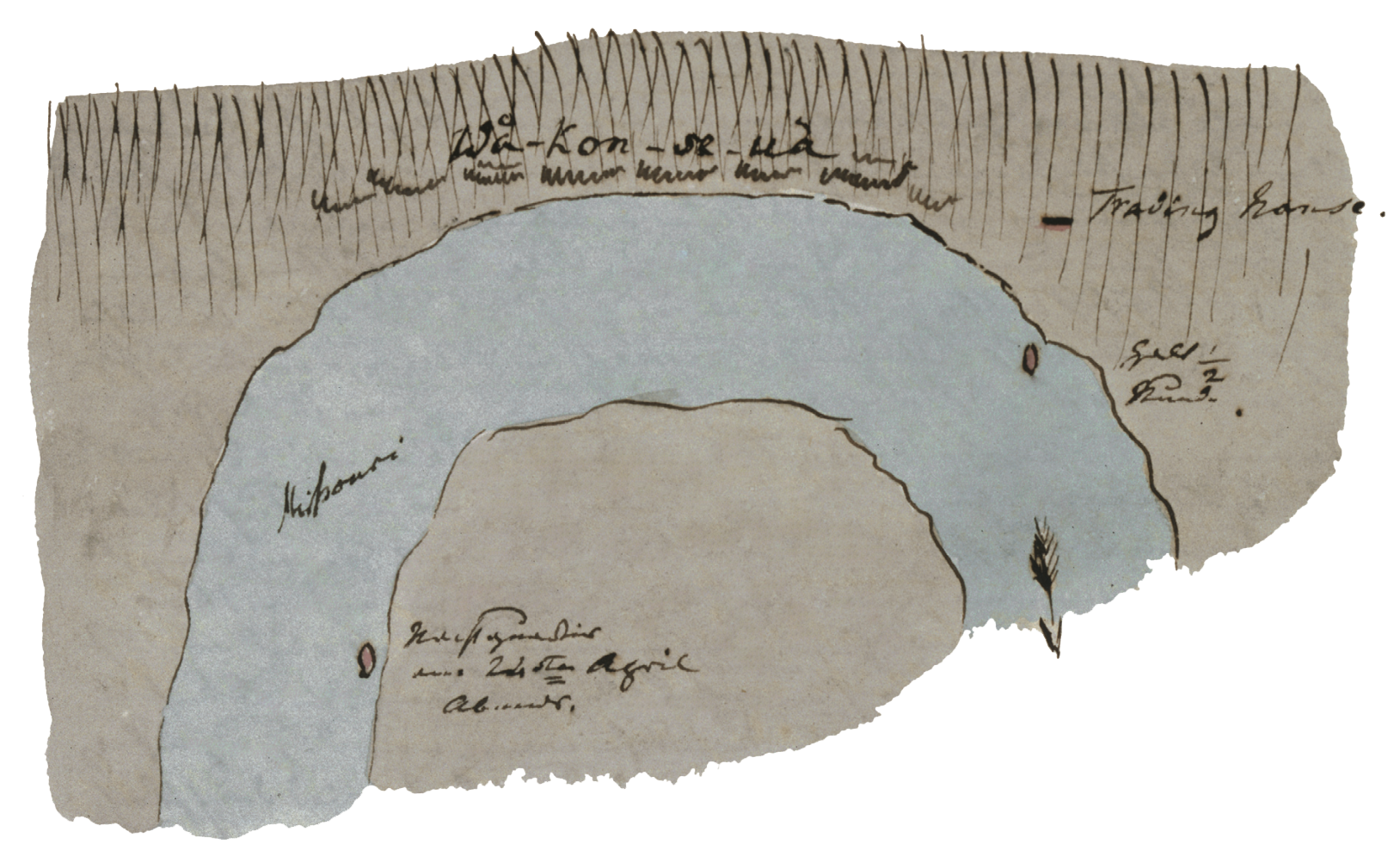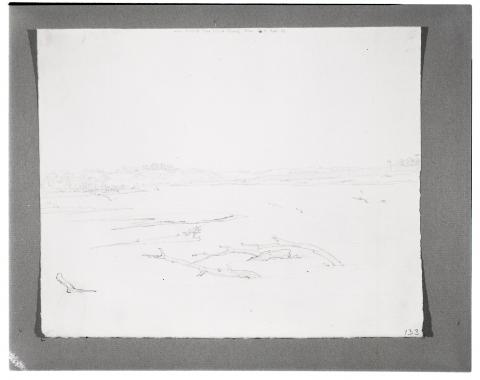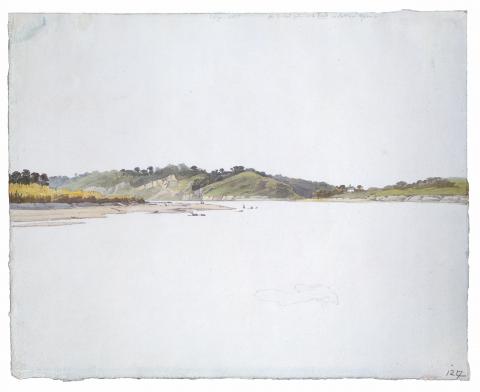April 24, 1833
24 April: Early in the morning, rain, but pleasant, then slightly overcast. We received violent jolts and ran onto sandbars. To the left, intermittent, beautiful hills with new foliage [and] bare, yellow, rocky areas. Finally we remain almost completely aground. The boat must take soundings all around. At 7:30, 68°F [20°C].M3At noon, 75°F [23.9°C]. They finally let the ship drift far back and then found a passage more in the middle of the river. To the right, willows, and behind them, cottonwoods, all of them already green. To the left, beautiful, rough, somewhat rugged hills. Ravines full of various kinds of timber; yellow limestone walls. This intermittent row of hills recedes from the river, and to the left and right we have eroded, somewhat lower banks [with] willow and cottonwood on them.
An hour and a half later, the Blacksnake Hills appeared before us. But before this, we again had a very bad passage with many snags in the river; we received hard jolts; the engine often stopped. Extraordinarily beautiful view of the hill chain and the forests all around; the soft colors greatly variegated, all refracted by misty air. We reached a spot full of snags, [and] we bumped against them on all sides. We received severe jolts, but ropes from the boat were fastened to the logs, and in this manner, after an hour we successfully worked our way through. A gaggle of Anser canadensis was missed. The left bank near which we [were] steering was steep, 29 feet high; [it] revealed excellent, often very black soil. Often [there were] boulders and large limestone blocks on shore. The green color of the forest [was] most picturesque. We again received severe jolts from snags, often ran aground, [and] moved only slowly, finally, to the right bank. Here there was tall forest in which we saw crows and ravens; with the rifle the pilot shot a gray eagle, which the boat brought to us.
We put in here and set the axes into motion, which were heard striking from every direction. The floor of the forest was only partly overgrown with dense rushes. For the first time, Dreidoppel brought back the recently completely opened blossoms of the pawpaw tree and a small species of Equisetum. The overheated woodcutters came leaping down from the high banks and lay down flat on the shore or on old trunks there and drank from the cold river. A Spaniard who had recently done this experienced severe abdominal pains immediately afterward, which one of the clerks relieved with a Spanish fly [cantharides] plaster.[Page 2:35] Today we had wind for the greater part of the day, especially in the afternoon.
[After all this,] we cast off, and about an hour and a half later, the Blacksnake Hills (Wåkán-Se-Uä of the Iowa Indians) appeared before us. They are very scenic, moderately high, [and] wooded, with open green areas on them; to the front, the river has steeply eroded the hills. Here reddish yellow, pointed, wavelike bluffs appear; the entire forests in their springtime colors and very picturesque in the most beautiful twilight. Mr. Bodmer made a sketch of the hill chain and of the white trading house situated in front of them on an open green area. Upon closer approach we saw sharp edges and ridges on the hills.M4Here it must be noted that not the entire hill chain but just the spot right in front of along the river with the yellow bluffs bears the name Blacksnake Hills. The hill chains themselves extend one on each side of the river, which winds back and forth in the valley located in between them. A few men who are in the service of the Fur Company live in the house. We put in here for a moment.
The men, all of them French, came on board and related that a raiding party of the Iowa Indians (they live 5 or 6 miles from the house) attacked several lodges of the Omahas (on the other side of the river) a few days ago. [They] killed two men, four women, and children, wounded several persons, and took a woman and a child prisoner, whom they [later] offered for sale at the trading house. Dougherty, whose agency includes the Omahas, took charge of the matter and remained behind to claim the woman. Bodmer and Major Bean accompanied him. We sailed on for about a quarter of an hour, when we put in near the high bank, cut wood, and stayed for the night. Our traveling companions did not return until about eleven o’clock. The Indians had assumed they would be reprimanded, and all of them, not excluding the chief, had intoxicated themselves. The prisoners were also drunk. They had sold their wool blankets and all sorts of things for whiskey. Dougherty [decided] to have the squaw fetched [later] from farther upstream, since it was not possible now to do this here.
They had sold their wool blankets and all sorts of things for whiskey. Dougherty [decided] to have the squaw fetched [later] from farther upstream, since it was not possible now to do this here.




